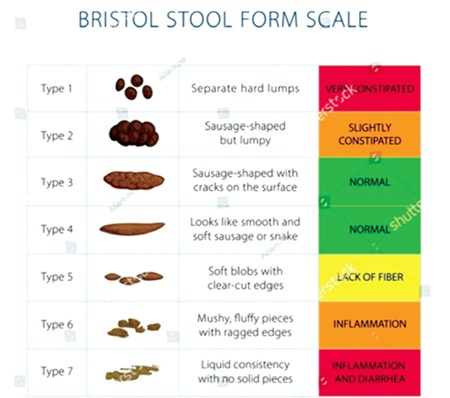“What goes into our bodies shapes us, but what comes out speaks volumes!" Have you ever considered what your stool might be revealing about your health?
What your poop looks like can be important. Your stool's characteristics, including colour, shape and consistency offer valuable clues about your diet, fluid intake, medications, and lifestyle.
Paying attention to these signals can help you stay informed about your overall well-being.
So, before you flush your stool, it is important to have a look at it to gain valuable insight into your health.
Signs healthy bowel
Bowel movements differ widely between individuals, occurring anywhere from one to three times daily, to three times weekly. Ideally, the process should be swift and effortless, taking under a minute once seated.
While holding off briefly should be manageable, the experience itself should be free from pain or strain. Healthy stools are well-formed and easy to pass, rather than hard and dry, with their colour ranging from light to dark brown.
These characteristics signal optimal digestive health and proper bowel function.
The Bristol Stool Chart is a handy tool for decoding what your stools reveal about your overall health.
In 1997, Dr Stephen Lewis and Dr Ken Heaton from the University of Bristol created the Bristol Stool Chart as a universal clinical tool for assessing human faeces.
While widely used by medical professionals, this chart is also an excellent resource for anyone aiming to track and enhance their bowel movements.
It categorises stools into seven types, highlighting that individual bowel habits vary.
The key takeaway? Healthy stools should be soft, easy to pass and resemble types three and four on the chart.
Management, constipation, diarrhoea
Constipation can present itself in diverse ways, such as not passing stools for one or more days, passing small and firm stools or struggling with a large, compact stool that is difficult to pass.
It occurs when stool moves too slowly through the digestive system, which can be caused by a variety of factors including inadequate fibre intake, insufficient water consumption, stress or anxiety, holding stools for too long, certain medications, lack of exercise or underlying medical conditions like irritable bowel syndrome.
To prevent constipation, it is essential to stay hydrated by drinking plenty of water, incorporate fibre-rich foods like fruits, vegetables, whole-grain and cereals, such as wheat, millet, maize and fonio into your diet, and maintain an active lifestyle.
Exercise, such as a 30-minute daily walk, helps stimulate intestinal movement and supports regular bowel function.
Diarrhea refers to the frequent passing of loose or watery stools, often accompanied by abdominal discomfort or cramps.
It can be caused by several factors, including infections (such as bacteria, viral or parasitic), food intolerances, certain medications or underlying medical conditions like irritable bowel syndrome.
Managing mild diarrhoea starts with staying hydrated by drinking plenty of fluids to prevent dehydration.
Consuming foods rich in potassium and sodium, such as bananas and coconut water, can also help.
While moderating fibre intake is important, incorporating probiotics like yoghurt may aid in recovery—though those who are lactose intolerant should steer clear to avoid discomfort.
These steps can help restore balance in your digestive system.
In most cases, sudden diarrhoea resolves naturally within a couple of days, requiring no medical treatment.
However, if home remedies and lifestyle changes fail to provide relief, consult your healthcare provider for guidance on medications or further interventions.
Monitoring bowel movements can provide valuable insights into your digestive health.
Factors like diet play a significant role in determining the shape and consistency of stools and making dietary adjustments can support regular bowel movements and a return to healthy stool types.
While changes in stool appearance are not always a cause for concern, it’s important to keep an eye on them.
Tools like the Bristol Stool Chart, combined with healthy lifestyle practices, empower individuals to take charge of their digestive well-being.
Staying informed and proactive allows the body’s natural processes to function smoothly, fostering a balanced and healthy digestive system.
However, if normal stools are rarely observed, consulting a physician is advisable, as abnormal stool patterns may point to underlying health issues.
The writers are students of the Department of Dietetics,
School of Biomedical and Allied Health Sciences,
College of Health Sciences, University of Ghana.

